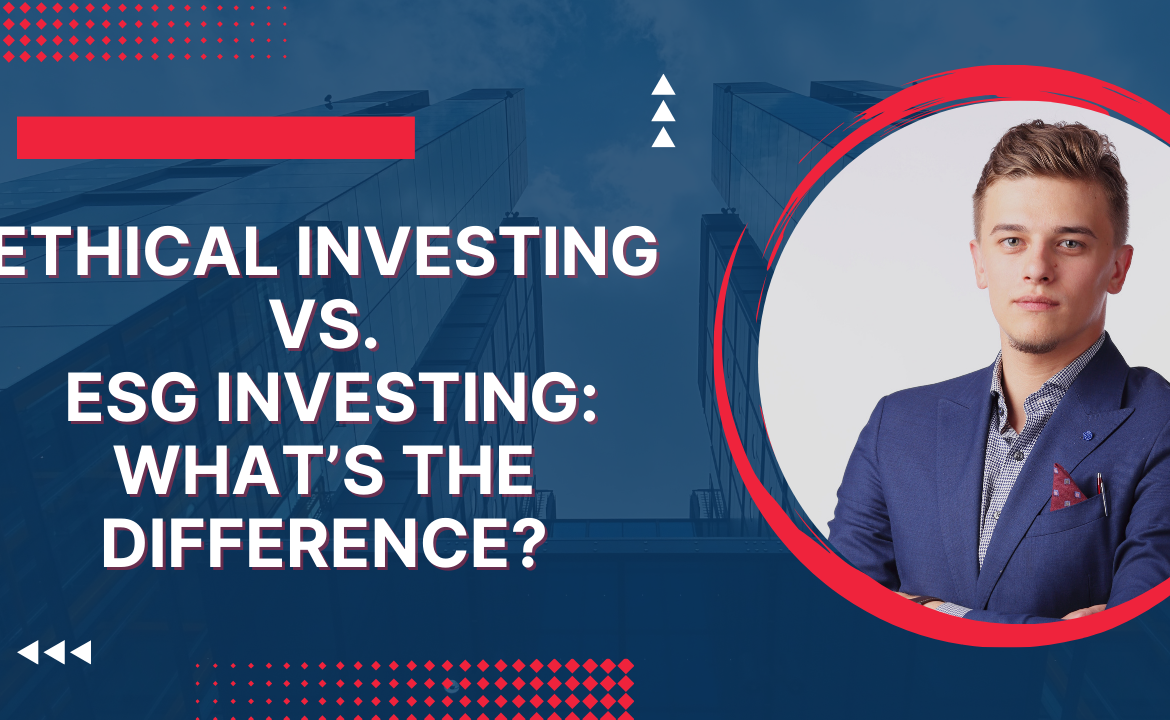Ethical investing and ESG (Environmental, Social, and Governance) investing are two prominent approaches that prioritize societal and environmental considerations alongside financial returns. While both aim to align investments with values, they differ in their focus and methodology. Ethical investing typically involves screening out investments that conflict with certain moral or ethical beliefs, such as avoiding industries like tobacco or weapons. In contrast, ESG investing integrates environmental, social, and governance factors into investment analysis to identify companies with sustainable business practices. This introduction sets the stage for exploring the nuances between these two approaches and their implications for investors seeking to make socially responsible investment decisions.

Definition and Overview
Ethical investing involves aligning investment decisions with personal or societal moral or ethical beliefs. Investors screen out companies or industries that engage in activities perceived as unethical or harmful, such as tobacco production or environmental degradation. The primary focus is on avoiding investments that conflict with ethical principles, regardless of their financial performance.
In contrast, ESG (Environmental, Social, and Governance) investing integrates environmental, social, and governance factors into investment analysis. ESG investing seeks to identify companies with sustainable business practices and positive societal impacts while still achieving competitive financial returns. This approach considers not only ethical considerations but also the long-term sustainability and resilience of companies, recognizing that strong ESG performance can correlate with better financial performance over time.
Investment Criteria
Ethical investing typically employs negative screening criteria to exclude investments that violate specific moral or ethical principles. This approach involves avoiding companies involved in controversial industries such as tobacco, weapons, or gambling. Additionally, ethical investors may consider factors such as labor practices, human rights violations, or animal welfare when selecting investments.
On the other hand, ESG investing utilizes a broader set of criteria that encompasses environmental, social, and governance factors. These criteria evaluate a company’s sustainability practices, social impact, and corporate governance structure. Environmental criteria may include carbon emissions, resource usage, and environmental management policies. Social factors may assess labor practices, diversity and inclusion, and community engagement. Governance criteria may examine board diversity, executive compensation, and transparency in financial reporting.
Focus and Objectives
Ethical investing centers on aligning investment decisions with personal or societal moral and ethical beliefs. The primary objective is to avoid supporting companies or industries that engage in activities perceived as unethical or harmful. This approach reflects investors’ values and aims to promote positive social change by directing capital towards companies with responsible business practices.
In contrast, ESG (Environmental, Social, and Governance) investing adopts a broader focus on sustainability and corporate responsibility. The objective is to integrate environmental, social, and governance factors into investment analysis to identify companies with strong ESG performance. ESG investing seeks to support companies that prioritize sustainability, social responsibility, and ethical governance practices while still generating competitive financial returns. By considering a wider range of factors beyond ethics alone, ESG investing aims to contribute to long-term value creation and address global challenges such as climate change, social inequality, and corporate misconduct.
Investment Approach
Ethical investing typically employs a negative screening approach, where investments are screened out based on specific moral or ethical criteria. Investors exclude companies or industries that engage in activities perceived as unethical or harmful, such as tobacco production or environmental degradation. This approach focuses on avoiding investments that conflict with ethical principles, regardless of their financial performance.
In contrast, ESG (Environmental, Social, and Governance) investing utilizes a more comprehensive approach that integrates ESG factors into investment analysis. Rather than simply screening out undesirable investments, ESG investing evaluates companies based on their sustainability practices, social impact, and governance structure. This approach seeks to identify companies with strong ESG performance while still achieving competitive financial returns. ESG investing aims to promote responsible corporate behavior and address global challenges such as climate change, social inequality, and corporate governance issues.
Financial Performance and Returns
Ethical investing’s impact on financial performance can vary depending on the specific ethical criteria applied and market conditions. By excluding certain industries or companies, ethical investors may miss out on potential opportunities in sectors with strong financial performance. However, ethical investing can also mitigate risks associated with companies involved in controversial activities, potentially leading to more stable returns over the long term.
Similarly, ESG (Environmental, Social, and Governance) investing’s effect on financial performance is subject to debate. Some studies suggest that companies with strong ESG performance may outperform their peers financially over the long term, as they tend to have better risk management practices and stronger reputations. However, ESG investing may also involve additional costs associated with ESG research and analysis.
Investor Motivations and Preferences
Ethical investing often attracts investors who prioritize aligning their investments with their personal values and beliefs. These investors may seek to avoid supporting companies involved in activities they find objectionable, such as tobacco production, weapons manufacturing, or environmental degradation. Ethical investors are motivated by the desire to make a positive impact on society and may be willing to accept potentially lower financial returns in exchange for investing in line with their values.
In contrast, ESG (Environmental, Social, and Governance) investing appeals to investors interested in integrating sustainability and responsible business practices into their investment decisions. These investors recognize the importance of considering environmental, social, and governance factors alongside financial performance and seek opportunities to support companies with strong ESG performance. ESG investors prioritize long-term value creation, risk management, and corporate responsibility in their investment portfolios.
Regulatory Environment and Standards
Ethical investing operates within a regulatory framework that may vary depending on the jurisdiction. While there are no universal standards governing ethical investing, regulatory bodies may impose guidelines or requirements for disclosing ethical criteria or providing transparency regarding investment decisions. Additionally, regulatory agencies may offer certifications or labels for ethical investment products, helping investors identify investments that meet certain ethical standards.
ESG (Environmental, Social, and Governance) investing operates within a similar regulatory environment but focuses on integrating ESG factors into investment analysis. Regulatory bodies may require companies to disclose information related to their ESG performance, such as environmental impact assessments, social responsibility initiatives, and corporate governance practices. Moreover, regulators may encourage or mandate ESG reporting standards to enhance transparency and accountability in the financial markets.
Conclusion
In conclusion, while both ethical investing and ESG (Environmental, Social, and Governance) investing share the goal of aligning investments with values, they differ in focus and methodology. Ethical investing primarily involves negative screening to exclude investments that conflict with moral or ethical beliefs, regardless of financial performance. In contrast, ESG investing integrates environmental, social, and governance factors into investment analysis to identify companies with sustainable practices, aiming to generate competitive financial returns. Ethical investing prioritizes values alignment, while ESG investing emphasizes long-term sustainability and responsible corporate behavior.
Also Read:
- What is Dividend Investing and How to find Dividend Stocks?
- How do new mobile banking apps help access savings account better?
- Financial Advisor in India – The Best for your Financial Planning?
- What is inflation and how it impacts your financial plan?

Hello, I am Tanisha Kriplani, graduated in computer science from Delhi University. I am passionate about web content writing and have a strong interest in Data Analytics and Data Engineering.












